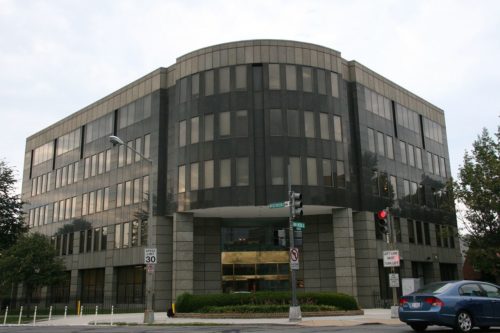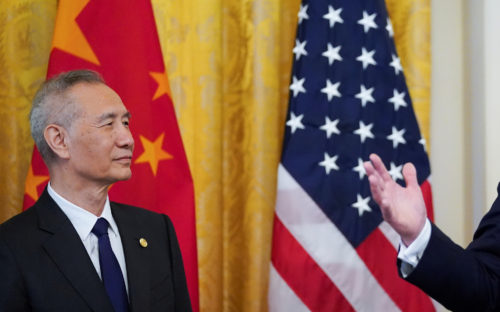Trade war, day 138: Fast track for new tech exports restrictions
The Trump administration has stepped up the high-tech side of its trade fight with China with the publication of a request for public comment on tightening export controls by the Commerce Department.
- The request seeks input on identifying “emerging technologies that are essential to the national security of the United States.” The current list covers 14 broad categories of technology that have dual civilian and military applications, including artificial intelligence, biotech, microprocessors, advanced computing, and robotics.
- Political risk consultancy Eurasia Group’s Paul Triolo commented on Twitter: “Huge…while this is only call for comments on reference list of technologies, the vast majority are likely to stay on the list…clearly directed primarily at China.”
- Deutsche Bank predicts a “profound and long lasting adverse impact” on U.S.-China relations if the measure goes forward, according to Bloomberg (porous paywall).
- U.S. Commerce Department officials call this part of “the most complex, intellectually challenging, and economically significant effort to identify simultaneously multiple disparate categories of undefined emerging technologies for non-specific national security concerns,” according to Politico. However, the fast-track comment period of 30 days, instead of the typical 60, comes just as the holidays get under way, along with the busy year-end work period when those in the industry are focused on meeting annual goals.
- More background from Politico:
The rule will implement portions of the Export Control Reform Act, which was passed in Congress in August as part of a broader defense bill that included a major overhaul of U.S. investment screening procedures. The legislation allows the Trump administration to cite national security to control exports of goods or technology that may not necessarily have a military use but could have economic or competitive advantages.
Nvidia and SenseTime in the crosshairs?
Here is another development that could have serious implications for tech firms on both sides of the Pacific. Nvidia, which makes advanced computer chips used in AI applications, sells to U.S. firms such as Uber and Microsoft, but, as the WSJ (paywall) reports:
Nvidia gets even more revenue from China. Chinese tech giants including Alibaba Group Holding Ltd. and Baidu Inc. use its products. So do companies developing facial-recognition and other domestic police and surveillance technologies, along with a university lab that worked with Chinese military researchers.
One customer that Nvidia has been “indispensable” to is SenseTime, described by Bloomberg (porous paywall) as “the world’s most valuable AI startup,” with investment from Alibaba, Fidelity International, Qualcomm, Silver Lake, and Tiger Global Management.
SenseTime sells artificial intelligence software that recognizes things, especially people… Various Chinese police departments use its SenseTotem and SenseFace systems to analyze security footage and bust suspects….
In September, China named SenseTime one of five “national champions” in AI alongside internet powerhouses such as Alibaba Group Holding Ltd. and Tencent Holdings Ltd., a distinction that means critics and U.S. officials will be watching its expansion more closely.
More trade-war-related news:
- More hard times for China
China is paying for most of Trump’s trade war, research says / Bloomberg (porous paywall)
“U.S. companies and consumers will only pay 4.5 percent more after the nation imposed 25 percent tariffs on $250 billion of Chinese goods, and the other 20.5 percent toll will fall on Chinese producers.”
Trade war, slowing economy test China’s biggest travel site / The Information (paywall)
“Ctrip.com, China’s biggest travel and hotel booking website, is getting pummeled by investors. After forecasting earlier this month that profits could fall to zero next quarter and warning it couldn’t predict next year because of the slowing pace of economic growth amid a trade war, shares of the New York–listed stock fell 19%. It now trades at about half its 52-week high.” - Winners: The rest of Asia?
No winners in US-China trade spat — says who? / Deutsche Welle
“According to research done by Japanese financial services company Nomura Holdings, the search of companies based in the US and China for suitable substitution for certain tariff-affected goods is benefiting Malaysia in particular, but Japan, Pakistan, Thailand and the Philippines are also among the beneficiaries…. Also in Asia, Vietnam has been gaining the most from firms relocating their production away from China. Malaysia, Singapore and India have also been profiting from this development.”
Malaysia best placed to benefit from China-US trade war: Nomura / Financial Times (paywall)
“Nomura assessed the list of 7,705 products affected by the tariffs, along with the value of those products to thirteen Asian countries. It then built the Nomura Import Substitution Index, a five-criteria index to measure how the countries could benefit from import substitution.” - Friendly signs
USS Ronald Reagan carrier group to visit Hong Kong as China holds out olive branch to America / SCMP
“Military analysts said the fact that the ships had been given approval to dock on Wednesday indicated that Beijing was trying to calm things down ahead of a meeting between Xi Jinping and Donald Trump at the G20 summit at the end of the month.” - Controversial aid for American farmers
A $12 billion program to help farmers stung by Trump’s trade war has aided few / NYT (porous paywall)
“According to the Department of Agriculture, just $838 million has been paid out to farmers since the first $6 billion pot of money was made available in September.”
He’s an architect in Manhattan. He got $3,300 from Trump’s farm bailout / Washington Post (paywall)
“Yocom said he spends two weeks a year on his family farm in Ohio, but as a part-owner he was eligible for the bailout funds.”
Previously in The China Project’s trade war coverage:
Trade war, day 133: A letter from Beijing, and Peter Navarro in the naughty corner





